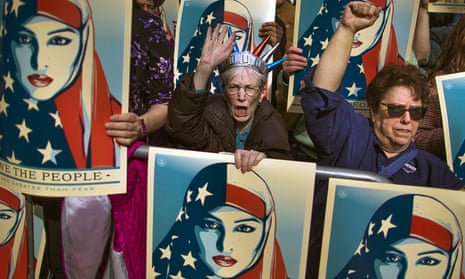President Trump’s second version of his executive order prohibiting travel to the United States by nationals from several Muslim-majority countries allows him to claim that he is fulfilling a campaign promise. That is, he is barring Muslims – or, Muslims from certain countries – from entering the United States.
Those to be excluded have not been designated because travelers from those countries have shown a propensity to engage in deadly terrorism. There has been no such case in the United States involving travelers from any of the six countries – Iran, Libya, Somalia, Sudan, Syria and Yemen – now on the list.
On the other hand, travelers to the United States from some other Muslim-majority countries omitted from President Trump’s ban have committed terrorist crimes that killed many Americans, including the 3,000 who died on September 11, 2001.
Why were these six countries chosen over others? Was it because President Trump did not worry about antagonizing their governments? Or because the president had no personal financial dealings with these countries? Or were there other considerations that remain obscure?
The previous order also excluded travelers from a seventh country, Iraq. Apparently, officials of the administration persuaded the president that it is not a good idea to stigmatize Iraqis as terrorists at a time when Iraqi forces, with American assistance, are fighting to expel the Islamic State from Mosul.
Also, some of the most damaging publicity resulting from the previous version of the order involved the exclusion of Iraqis. Those detained by federal agents as they tried to enter the United States included Iraqis who had assisted US forces when they occupied the country after the 2003 invasion by acting as translators.
Even officials of the president’s own Department of Homeland Security have recognized that this list of countries cannot be justified on grounds that they have been sources of terrorist attacks in the United States. Yet President Trump is probably able to persuade his supporters that by keeping out their nationals, he is keeping his word.
Unfortunately, in taking a step that is likely to increase antagonism to the United States, he is putting his political interests ahead of concern for the safety of his fellow Americans.
American law gives the president broad authority to exclude aliens who fall into categories that he decides are “detrimental to the interests of the United States.”. However, any exercise of presidential authority must take place in a manner consistent with the US constitution. In this case, it does not.
His failure to show that there is a realistic threat of terrorism from travelers from these six countries makes it clear that this is religious discrimination. It contradicts the constitutional guarantee of the free exercise of religion by excluding travelers because of their religion. It violates the prohibition on the establishment of religion by giving preference to those of other religions. And, of course, it disregards the constitutional requirement that all are entitled to the equal protection of the laws.
In the first version of President Trump’s executive order, which was blocked by the federal courts, the preference given to other religions was underscored by a provision favoring admissions to the US for those who are victims of religious persecution. They would qualify only if they are not members of the majority religion in countries covered by the order – that is, so long as they are not Muslims.
President Trump had wanted to benefit Christians. Dropping this provision from the revised executive order seems to be an effort to protect the order against invalidation by the courts.
Whether or not the courts strike down this version of the travel ban, no good will come of it. Some nationalists who voted for Trump because of his pledge to exclude Muslims will be satisfied with it. But it will deepen antagonism to the United States by many of the world’s one-and-a-half billion Muslims. The reputation of the United States as a country that is opposed to religious bias – and much more – will get damaged in the process.










